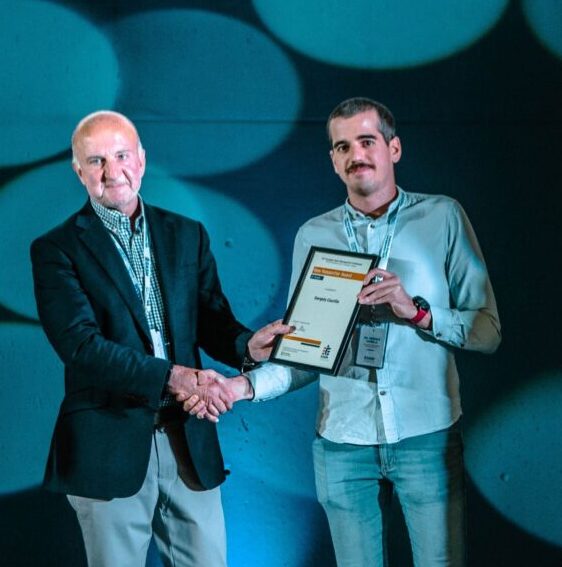The labor market effects of worker outflow: Evidence from Hungary
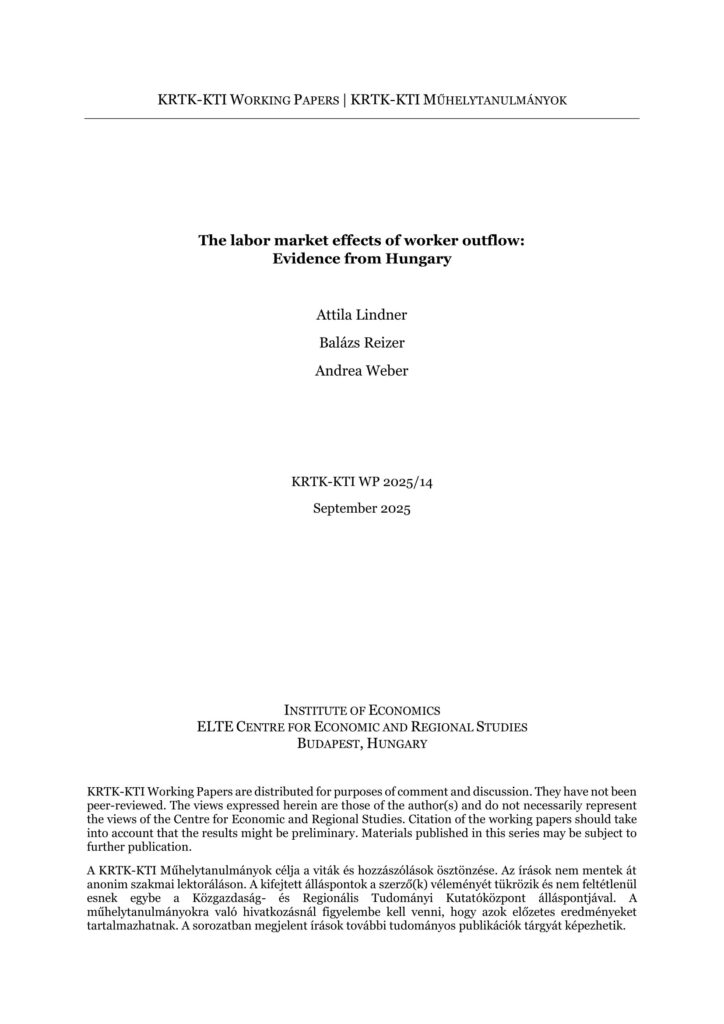
We investigate how a large-scale outflow of workers affect the reaming workforce. We use Hungarian administrative social security data on the opening of the Austrian labor market to Hungarian workers as a natural experiment. We find that the opening of the Austrian border increased wages by 1 percent and decreased employment by 5 percent in […]
Adolescent Core Self-Evaluation and Adult Interpersonal Trust: Evidence from the 1970 British Cohort Study
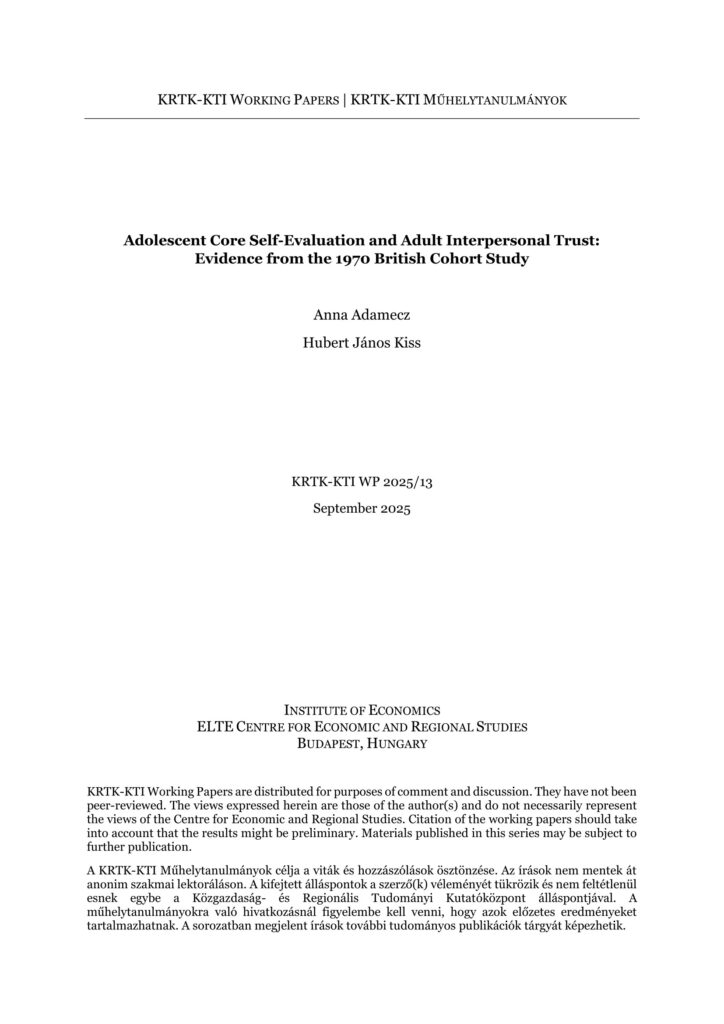
This paper investigates whether adolescents’ core self-evaluation (CSE), a broad personality construct capturing individuals’ appraisal of their self-worth and capabilities, predicts interpersonal trust decades later. Using nationally representative longitudinal data from the 1970 British Cohort Study, we construct CSE measures from self-esteem, locus of control, and emotional stability at age 16 and examine their relationship […]
A One-Sentence Nudge Against Present Focus
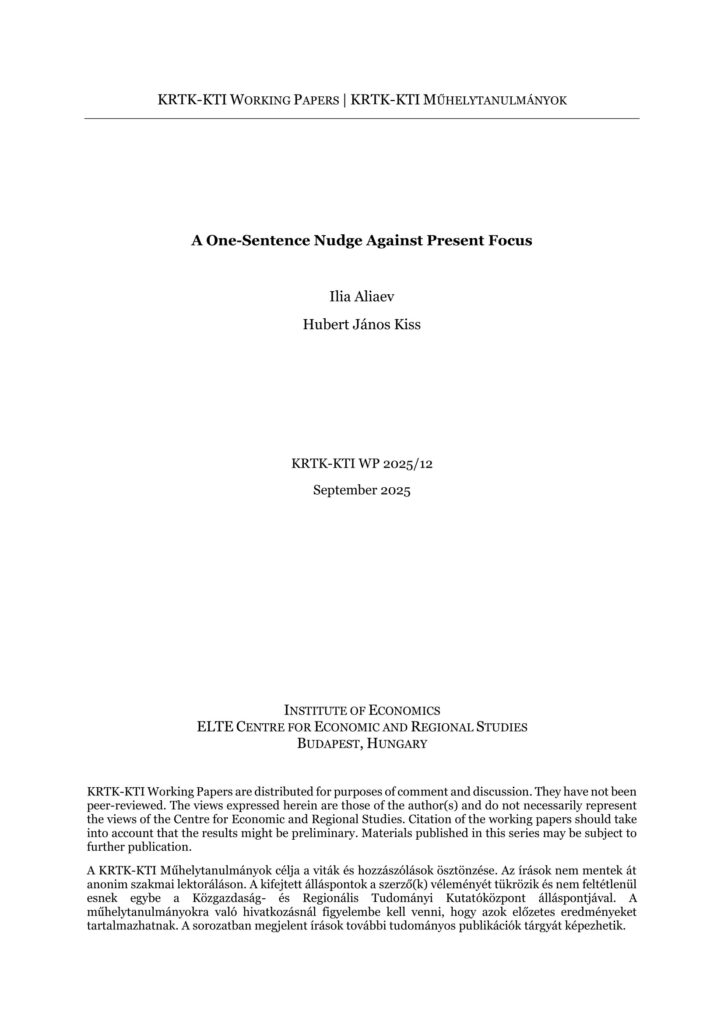
We test whether a single, neutral sentence reduces present-focused intertemporal choices. In a pre-registered classroom experiment (N=210) at Corvinus University of Budapest, first-year students made eight incentivized choices between a smaller immediate amount and larger amounts in two weeks. The treatment added a one-line, non-directive prompt—“Think carefully about all the possibilities that money would provide […]
The impact of heat and cold on excess mortality and life expectancy in Europe, 2015–2024
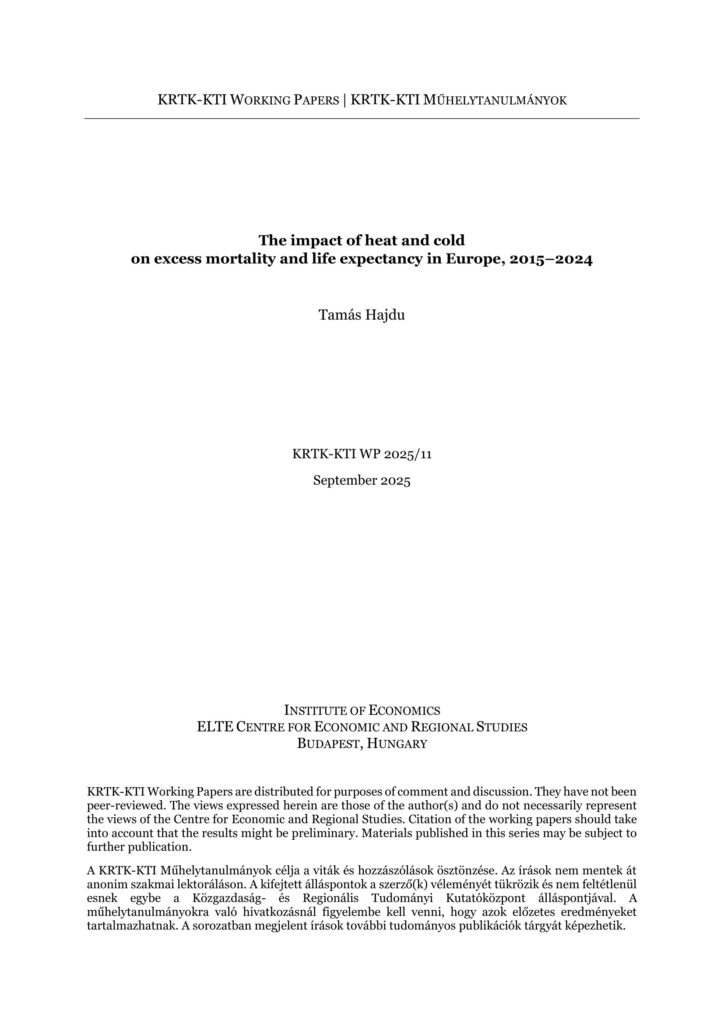
This paper analyzes the effects of temperatures on mortality and life expectancy using data on 40 million deaths across 73 geographic regions in 28 European countries between 2015 and 2024. The findings indicate that both cold and hot temperatures increase mortality rates, with cold having a stronger overall effect. Heat-related mortality tends to be immediate, […]
Exploring the role of age structure in regional population change of the Visegrad Group

Csaba G. Tóth, József Lennert Abstract: A caveat of much of the existing demographic literature is that it decomposes population change into the components of fertility, mortality, and migration, treating ageing merely as a consequence of natural change while neglecting the role of age structure in the observed dynamics. This study applies a scenario-based decomposition […]
The positive effect of moral self-concept on fraudulent behavior and the need for moral cleansing
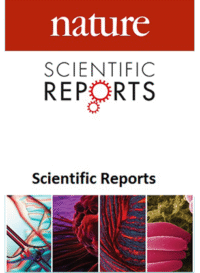
Tamás Keller , Péter Szakál Sci Rep 15, 31898 (2025) Abstract: Both moral cleansing and moral licensing theories suggest that moral self-concept positively influences subsequent engagement in fraudulent behavior. Specifically, a decrease in moral self-concept reduces dishonesty (moral cleansing), while an increase promotes it (moral licensing). However, within these theoretical frameworks, prior research has rarely […]
A humán kutatás társadalmi hatásairól

Fertő Imre Magyar Tudomány, 186/8 (2025), 1605–1612 Absztrakt: A tanulmány áttekinti a tudományos kutatások társadalmi hatásairól szóló irodalmat, különös te-kintettel a humán tudományokra. Az elmúlt években a kutatások társadalmi hatásainak jelentőségemegnőtt, ebből következően a tudományos eredményeket nemcsak a tudományos közösség, hanem atársadalom számára is kiemelten szükséges hasznosíthatóvá tenni. Az eredményesség felmérését hát-ráltatja, hogy a hagyományos […]
Az inváziós fajok gazdasági költségei
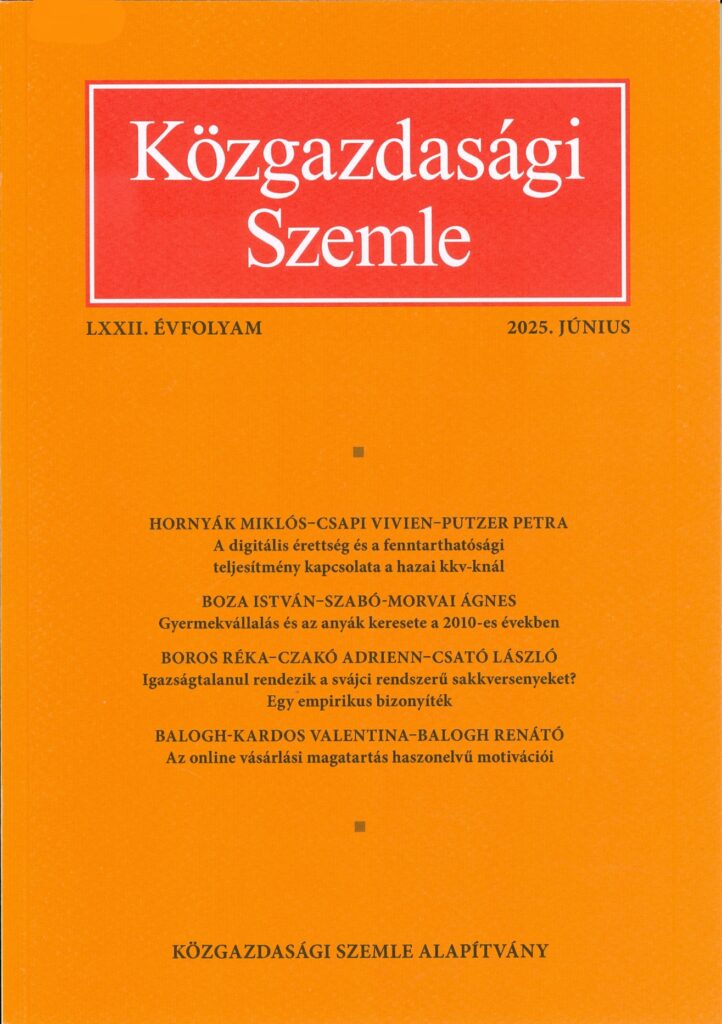
Fertő Imre – Garamszegi László Zsolt Közgazdasági Szemle, 72(7-8), 708-737. Absztrakt: Az inváziós fajok gazdasági költségeinek kérdésköre szemléletes példája a közgazdasági értelemben vett „puha költségvetési korlát” jelenségének. Tanulmányunk azt vizsgálja, hogyan vezet a probléma kezelésére irányuló stratégiai döntések halogatása olyan helyzethez, amelyben a kezdetben csekélynek tűnő gondok később exponenciális ütemben súlyosbodnak, jelentős gazdasági károkat és visszafordíthatatlan […]
Exploring the drivers of farm sustained participation in agri-environmental programmes
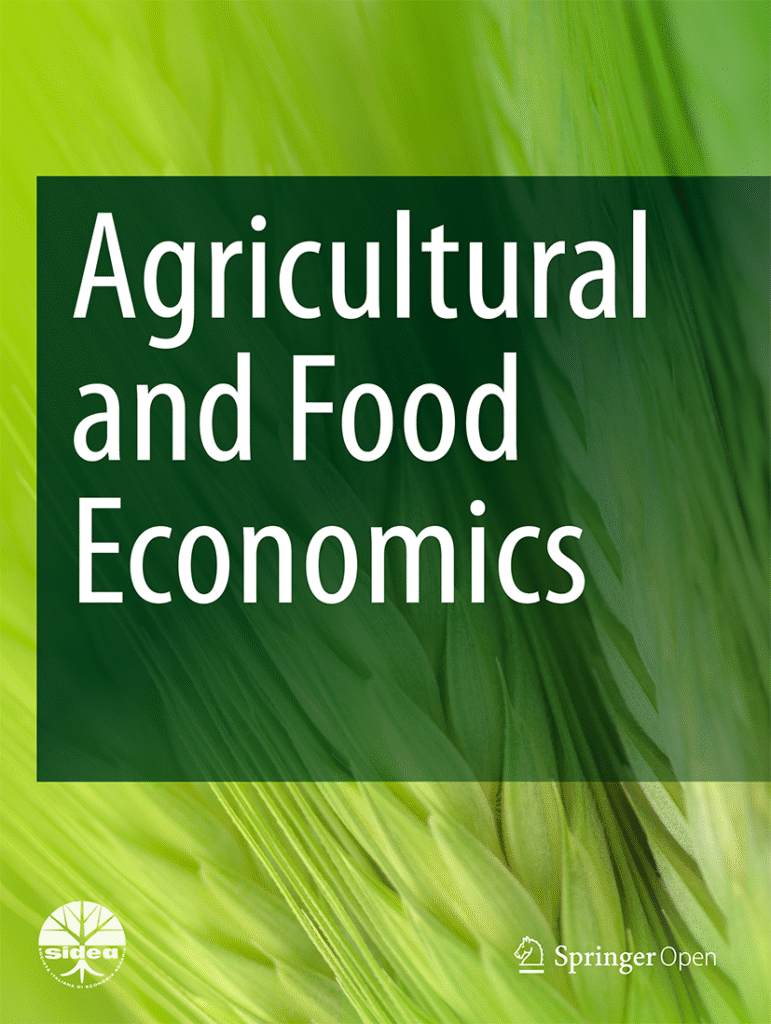
Imre Fertő – Stefan Bojnec Agric Econ 13, 50 (2025) Abstract: This paper examines the socioeconomic and institutional determinants influencing sustained participation in Agri-Environmental Climate Schemes (AECS), drawing on comprehensive panel data from Slovenian farms covering the period 2014–2021. Using discrete-time hazard models and nonparametric duration analysis, we identify economic resilience—characterised by larger farm size, income […]
How to encourage people to follow a climate-friendly diet? Increase social cohesion!
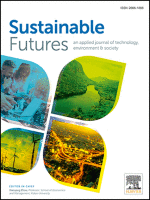
Zsófia Benedek – Lajos Baráth – Imre Fertő – Zoltán Bakucs Sustainable Futures, Vol. 10. Art. No. 101106 (2025) Abstract Reducing meat consumption is increasingly recognized as a necessary strategy for mitigating climate change and improving public health. While motivations to reduce meat intake are well documented, few studies have integrated these with basic human […]
Apportionment methods in resource allocation
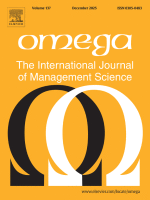
László Á. Kóczy – Tamás Koltai – Balázs R. Sziklai Omega, Vol. 138. Art. No. 103403. (2026) Legyen szó munkáltatói státuszok, drága berendezések projektek, kórházi ágyak területi- vagy ösztöndíjak tudományterületi elosztásáról a fair elosztás nem csak az igazságérzetünket nyugtatja meg, de a hatékony működést is segíti. Kóczy Á. László, Koltai Tamás és Sziklai R. Balázs olyan […]
Beyond the degree : fertility outcomes of ‘first in family’ graduates
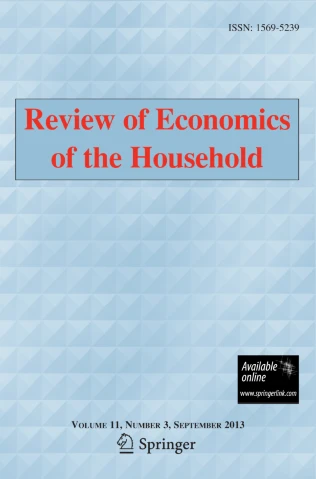
Anna Adamecz – Anna Lovász – Sunčica Vujić Review of Economics of the Household (2025) Abstract This paper examines the link between higher education and fertility, paying particular attention to the role of intergenerational educational mobility in shaping this relationship. Drawing on data from the 1970 British Cohort Study, we estimate differences in completed fertility across […]



